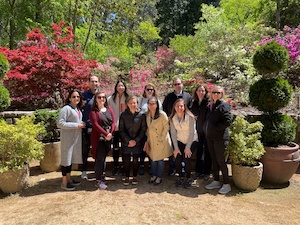Reflections From the Upcoming T32 Graduates

The Duke Center for Precision Medicine is pleased to announce the newest upcoming graduates of the Post-Doctoral Training in Genomic Medicine Research Program – Sarah Heston, MD, and Nathan Bihlmeyer, PhD. The post-doctoral training program is supported by an NIH-training award (T32).
Dr. Heston and Dr. Bihlmeyer both reflected on their rewarding time as post-docs. The two-year training program began during July of 2020 and will conclude at the end of June 2022.
The two will co-present at the upcoming Duke Center for Precision Medicine Forum on May 26, 2022, at 12 p.m. on Zoom. Learn more and register here.
Sarah Heston, MD
After completing medical school and residency training, I started fellowship at Duke as a pediatric infectious diseases fellow. I knew I wanted to learn how to conduct clinical and translational research in immunocompromised children, particularly those undergoing hematopoietic stem cell transplantation (HCT). My mentor, Matt Kelly, had already started building a biorepository of fecal samples from children undergoing HCT. From there, I learned a lot about metagenomics and the microbiome in an effort to utilize the gut microbiome to predict clinical outcomes in children undergoing HCT.
My time as a post-doc has been instrumental in starting a career as a physician-scientist. I have been able to focus on understanding how to conduct meaningful translational research while learning so much about genomics and metagenomics. The funding provided by the T32 allowed me to extend my fellowship training for an additional year so that I could build up additional research experiences and publications and apply for an NIH Career Development Award. The educational programs and seminars through the T32 exposed me to novel developments in genomics and precision medicine.
I am looking forward to staying at Duke as I transition to faculty in the Pediatric division of Infectious Diseases where I’ll split my time between clinical medicine and research.
Nathan Bihlmeyer, PhD

My T32 fellowship started right as the COVID-19 pandemic began. Along with many others who had to pivot with plans during the pandemic, so did my original research plan. The lifestyle obesity study I am involved with took blood and fecal samples from kids to look for biomarkers that could potentially predict the best course of intervention – whether that be with lifestyle, drug, or bariatric surgery interventions. However, first we faced the discrepancy of some kids starting the study before COVID, while others started during COVID. We decided instead to adapt and compare the two groups – normally kids came to a local rec center where they had a safe place to play and instead this was all happening virtually on Zoom. We had to be flexible and started dissecting out how well in-person vs. Zoom worked. This fellowship really crystallized the idea of looking for opportunities to ask different questions when conducting research.
One of the didactic trainings I did was taught by, now retired Duke faculty, Dr. Arthur Moseley, on proteomics mass spectrometry. It was a fascinating experience, even being virtual. My analysis skills with this type of data set were immensely improved during my T32 fellowship. Mentorship was also a key part of this fellowship. My mentors, Dr. Svati Shah, Dr. Sarah Armstrong, Dr. Chris Newguard, Dr. Geoff Ginsburg, among others, helped support my granting writing activities and provided so many connections to advance my research. My background is in human genetics, but these mentors and this fellowship really gave me more of an understanding of the patient and medicine side to inform my research.